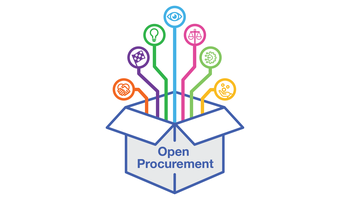
Commissioned by AWS Institute, the ODI has worked with Open Contracting Partnership (OCP) on a report highlighting these practices across different countries and sectors, with a particular focus on government IT procurement.
Our strategy has been to focus on ensuring procurement is data-driven, measurable and transparent and that this is consistent across government.
Australia’s Digital Transformation Agency
According to research by OCP and Spend Network, the global procurement market is estimated at $13 trillion annually. They further estimated that a staggering $2.6 trillion is lost in government procurement corruption globally each year. Open procurement is a transparent process that promotes competition, fairness, and accountability in government spending, helping to combat wrongdoing.
For governments, public procurement is an essential process for delivering goods, works and services to citizens. When conducted more openly and with integrity, it boosts public confidence but also - evidence shows - brings increased investment. In addition, the digital transformation of public services relies on access to cutting-edge IT and expertise that can be enabled by open procurement.
Beyond transparency
We discovered in our research that open procurement goes beyond the fundamental aspect of transparency to deliver a range of benefits.. It is better for suppliers, buyers and public services and it delivers better value for money. We identified seven characteristics (Fig 1) which demonstrate this impact. This model of the ‘levers’ for measuring and comparing the activities contributing to open procurement highlights the different ‘pathways to value’ available for governments.
Open data is the cornerstone of open procurement
We also found that publishing data openly increases the visibility of opportunities, enables people to track progress, and empowers different stakeholders. For example:
- Suppliers gain insights into government needs and develop targeted solutions
- Buyers improve collaboration and identify potential cost savings across different government departments
- Citizens are able to monitor and evaluate public spending, fostering trust and accountability
- AI and data analysts can deploy developing technology to more data, provide better insight and improve outcomes.
Key Findings
Through the ODI's collaboration with OCP and our extensive research, we've uncovered compelling evidence of the transformative power of open procurement:
- 1. Digital transformation: Open IT procurement is pivotal in enabling governments to tackle their biggest administrative challenge - digital transformation. By embracing open procurement, governments can seamlessly integrate innovative technologies, data-driven insights, and efficient digital workflows, enhancing the entire procurement lifecycle
- 2. Social and economic impact: Adopting open procurement practices yields significant social and economic benefits, often surpassing initial investments. From streamlining outdated processes to generating millions in additional revenue, the positive effects are undeniable
- 3. Transparency and accountability: Publishing open data with an open licence enhances visibility throughout the procurement cycle, empowering citizens and businesses to monitor and evaluate public procurement activities. This not only combats corruption but also enhances trust and accountability in the procurement process.
Case Studies
We found many success stories from countries embracing open procurement that are both inspiring and instructive. We developed the following examples into case studies:
- UK's G-Cloud: Supporting the Government Cloud First policy, G-Cloud has delivered over £1.5 billion in commercial benefits for public sector customers
- Australian reforms: Reforms have increased spending directed at SMEs to over 30%, surpassing the 20% target set for 2021
- Colombia’s savings: Streamlined procurement processes have resulted in savings exceeding $1 billion, as reported by the World Bank
- ChileCompra's cost reduction: IT product and service costs have been reduced by 28%, with software licence costs showing savings of over 70%.
Conclusion
Policymakers, civil society and industry advocates - including OCP, Spend Network are at a juncture where change is possible. With the support of robust evidence and persuasive case studies - outlined in our report - the potential exists to influence policy and encourage the uptake of open procurement practices globally. This approach delivers a more transparent, fair, and thriving future for everyone.
Thanks to Amazon Web Services (AWS Institute),for sponsoring this research.
Amazon Web Services Institute helps digital transformation leaders in governments and other public organisations around the world to reform and modernise public services using the cloud. The AWS Institute produces thought leadership content, provides an international executive education program, and maintains a by-invitation worldwide network of public sector leaders.
